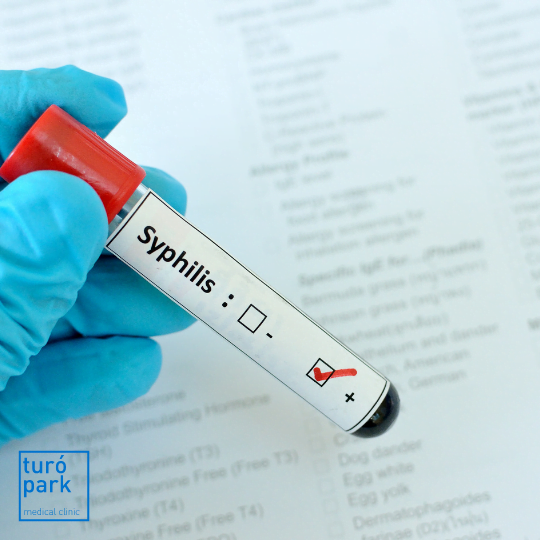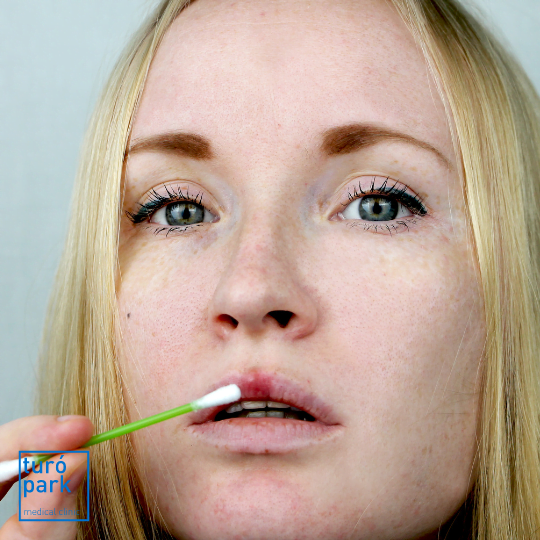What is the screening for syphilis?
The duration and symptoms of the different stages of syphilis vary greatly from person to person, making syphilis a difficult disease to diagnose.
As a rule, syphilis is diagnosed by serology. This test is based on a blood sample and consists of measuring specific antibodies, directed in particular against treponemes. The two most commonly used tests are the VDRL (Venereal Disease Research Laboratory) and the TPHA (Treponema Pallidum Haemagglutination Assay).
If the tests are negative, they must be repeated, given the one-month incubation period. If the tests are positive, you should be treated immediately.
If lesions are apparent, dark-field microscopy of the lesions may also be considered.
Screening and treatment of syphilis in Barcelona
On the rise again since 2000 after having almost disappeared in Europe, syphilis is a sexually transmitted infection (STI) that can lead to serious complications if left untreated.
If you have symptoms that suggest syphilis or if you have had unprotected sex, get tested so that you can start the appropriate treatment as soon as possible if you test positive.

→ Book the STD test best suited to your needs
We have different types of tests available depending on the analysis you want to perform. Choose the one that best suits your needs.
What is syphilis?
Syphilis is a sexually transmitted disease caused by a bacterium called Treponema pallidum. It is a strictly human disease causing skin and mucous membrane lesions of varying appearance.
Syphilis used to be a major cause of disability and death, but has become much less prevalent since the discovery of antibiotics in 1945.
Untreated, the disease develops in three stages:
- The primary stage
- The secondary stage
- Tertiary stage
Syphilis: symptoms
The symptoms of syphilis change as the disease progresses.
In the primary stage of syphilis
The symptoms of syphilis occur on average 3 weeks after infection and include
- Superficial ulcerations, also called chancres, on the mucous membranes (genitals, anus or mouth)
- Enlarged lymph nodes
The secondary stage of syphilis
The secondary stage appears three to ten weeks after the chancre. It is manifested by the appearance of :
- Syphilitic eczema on the trunk, face, palms, soles or other parts of the body
- Flat, dull pink or grey hypertrophic papules at the mucocutaneous junction and in moist areas of the skin
- Fever
- Loss of appetite
- Nausea
- Fatigue
- Neurological problems: meningitis, paralysis of part of the face, etc.
The latency period of syphilis
Approximately 2 years after infection, syphilis enters a latent period, when no symptoms appear. However, the infection can still develop. This period can last from 1 to 30 years.
Tertiary stage of syphilis
About a third of untreated cases develop late or tertiary syphilis, although sometimes this does not occur until years or decades after infection.
This form of syphilis usually manifests itself in three ways:
- Neurological damage with tabies, mood disorders, etc.
- Cardiovascular disease with arteritis: damage to the aorta which occurs between 10 and 20 years after the start of the infection and which can lead to its rupture (aneurysm).
- Ocular damage: the retina, the blood vessels that supply the eye and the nerves can be irreversibly damaged and lead to blindness.
These complications can lead to death.

What should I do if I test positive?
If your STD test is positive, you can consult one of our English-speaking doctors at Turó Park Clinics. He or she will explain the results and guide you through the various treatment options available to you.
If you are HIV-positive, a combination of lifelong treatments (triple therapy) can be considered to stop the progression of the disease. However, it is not yet possible to completely eliminate the virus.
To treat syphilis, antibiotics are usually prescribed and the prognosis for recovery is very good. The patient's sexual partners must also be treated.
Antibiotics are the most common treatment for trichomonas vaginitis, gonorrhoea, lymphogranulomatosis venereum and mycoplasma infections.
Genital herpes cannot be completely eliminated. However, treatment can relieve the pain and limit the duration and intensity of the herpes if it recurs.
Finally, in the majority of cases, hepatitis B heals spontaneously, but in some cases it can become chronic.

Quality care network
How is syphilis transmitted?
Syphilis is transmitted by unprotected sexual intercourse (vaginal, anal or oral), by blood (transfusion or rarely use of contaminated equipment) and by transplacental transmission during pregnancy, from mother to child.
It is possible to contract syphilis several times in a lifetime.
Syphilis: treatment
If the diagnosis is confirmed, treatment with penicillin antibiotics should be started for the patient and his or her sexual partners.
If the infection has lasted for less than a year, a single dose may be sufficient. Further blood tests will be carried out after treatment to check whether the antibiotics have been effective.
How can syphilis be prevented?
Using a condom during sex, including oral sex, can help reduce the risk of getting or transmitting syphilis.
However, there is no vaccine that protects against syphilis.
Syphilis: FAQ